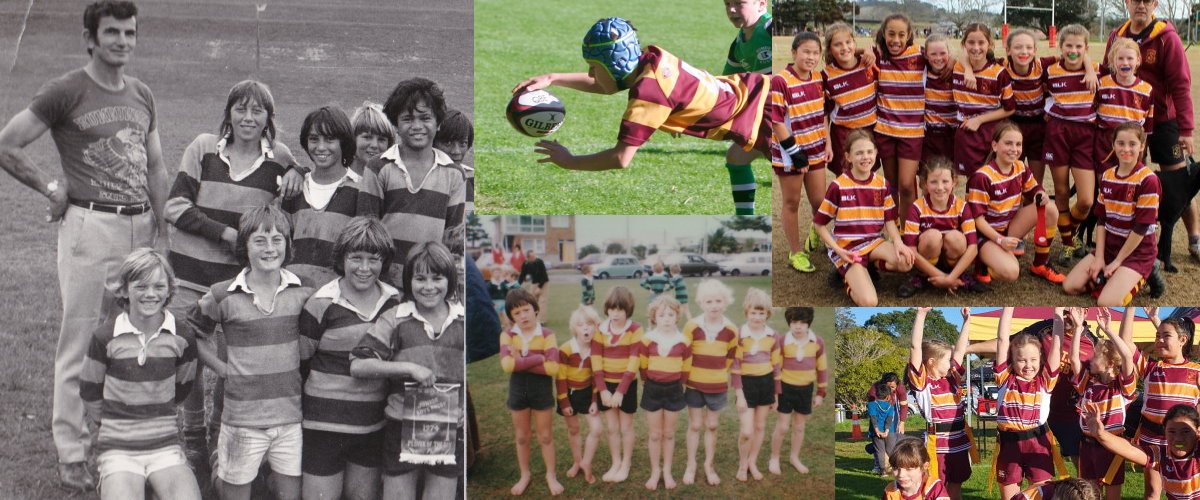
1970's at the Northcote Rugby Club
A
has been added.

A combined ball with the league club was held in 1970 for the second and last time. Fundraising was commenced to wards a club trip to Australia in March 1971.
The senior reserve team won the championship, becoming the first grade team to succeed since the third intermediates in 1947.
As a result of the fundraising efforts of the tour party, the club gained the franchise to run a housie session each Thurs day night at the Lion Tavern at the corner of Queen and Fort Streets in the city. For three years, Chum Arblaster, Tracy Watson and 'Snow' White spearheaded the groups that kept the evening going.
The club was in high spirits at the conclusion of the 1972 season after the senior team, coached by Bruce Robertson and captained by Dave Newman, won promotion back to senior A and the intermediate grade team claimed the Jordan Rose Bowl (a trophy the club would win again in 1973 and 1975).
The ninth grade team also took out the championship while the sixth graders won a knockout competition and the 11th grade maroon team won the plate competition. Overall, it was one of Northcote's most successful seasons. Financially, it was a bumper year also, with an excess over expenditure of $5,453 being recorded.
Negotiations with council continued throughout 1972 over the Birkenhead ground, with little to show. However, the area was cleared to enable chain grids to be established for the preparation of costs.
Regardless of what was discussed in the committee room, the real business relating to the Northcote Rugby Club happened around the funnel on the 5.15pm ferry from the city and finalised at the Trough by 6pm. Vince Paltridge, Duncan Taylor and Alex McLeod were always involved.
By 1973 the club had taken a bit of a dip in its playing strength. Although there were seven senior and grade teams fielded, junior boys teams were down to sixteen.
The senior team won the Jordan Rose Bowl for the second year in succession and the fifth grade team won the championship. Northcote's shining light was Stu Conn, a lanky loose forward, and sometimes lock, who became the club's first Auckland representative in 13 seasons. He played 27 times for Auckland over three seasons, aspiring to All Black status in 1976, the year after he crossed the bridge to join Grammar Old Boys.
A start was made on the ground at Birkenhead when earth moving machines stripped the top soil of the proposed No 1 ground to a stockpile and engineers made an assessment of the requirements. No lease had yet been signed but progress was certainly made in this direction.
A start was made on the ground at Birkenhead when earth moving machines stripped the top soil of the proposed No 1 ground to a stockpile and engineers made an assessment of the requirements. No lease had yet been signed but progress was certainly made in this direction.
The balance sheet to 30 September 1973 revealed assets of $23,502. Anticipating a start on the ground at Birkenhead, fundraising continued on several fronts, with Ken Meiklejohn and Graham Gibson devising a business plan which was accepted by the committee.
Keith Weber joined the committee in 1974 and took on the task of public relations. Keith also took over as club captain following Ken Meiklejohn's resignation (due to work commitments) and immediately set out to increase public awareness of the club's activities.
An outstanding playing season followed. While no championships were won, three trophies came to the club, the Jubilee Trophy won by the senior team, the Peter Mackie Trophy, claimed by the second grade maroon team, and the Bill Elworth Trophy, secured by the junior boys 13th maroon team. A tour sub-committee was formed, headed by Bruce Blackett, Keith Weber and 'Snow' White, to raise funds and plan for a world trip in 1976. Part of the tour agreement was that the club would not be financially affected.
Eddie Dunn, who had represented North Auckland in 1973, joined Northcote in 1974 while attending Teachers College and made an immediate impact, he and Alan Tingle winning selection for the Auckland B team. Dunn toured with Jack Gleeson's New Zealand Colts, emerging as the star player. The New Zealand Rugby Annual records that if 'the Colts tour (four matches in New Zealand) achieved nothing else, it reminded New Zealand of the genius of Eddie Dunn. He was given a free assignment by Gleeson. The little master made electrifying breaks in every match . . . performing with a maturity beyond his 19 years.
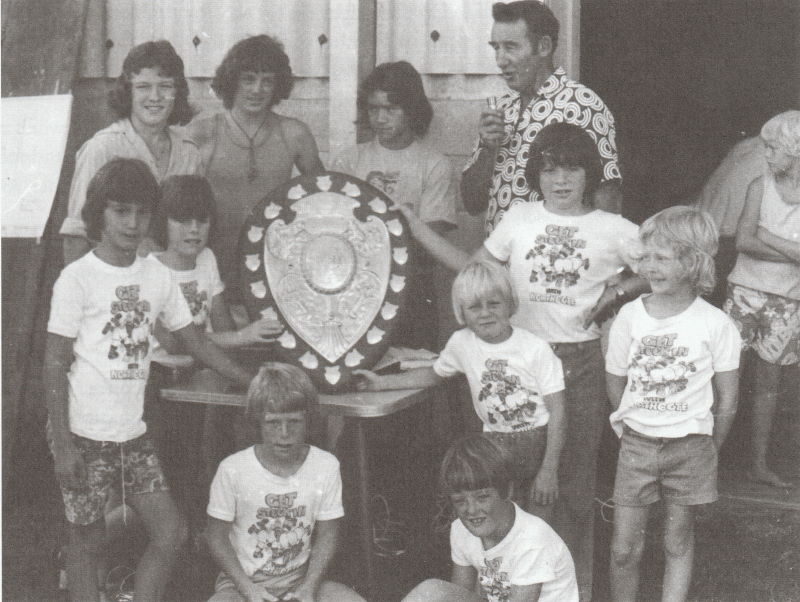
Surprisingly, the talented Dunn could never break into the Auckland A team, whose selectors preferred Mike Richards at first-five, but he went on to play 107 matches for Northland and 20 for the All Blacks, including two tests, both against Scotland.
At the end of the 1974 season, a fourth grade team travelled to Australia where, naturally, they were hosted by Western Suburbs, being billeted throughout.
Prizegiving was incorporated in a dinner held on 1 November at which Colin Meads, recently retired, was the guest speaker.
Included in the trophy list for the first time was a women's netball trophy. A Northcote team had been formed by wives and girlfriends of playing members of the club and competed in North Shore association games.
Northcote's new 'home' was secured late in 1974 when a lease was signed giving the club access to 12 acres of land for a term of 33 years, with the right of renewal for a further 33 years.
Soon after, talks were initiated with the Birkenhead RSA with a view to converting their club building into Northcote's headquarters on the new ground. It was an arrangement tl1at mutually benefited both clubs.
The RSA had taken an option on 10 acres of land just in side the border of Glenfield, on which the Birkenhead Council held some measure of control as tl1e land in question was re serve land. The other party involved was the Waitemata County Council.
In the meantime, Waitemata and Takapuna City Council rearranged their boundaries and the reserve land in question came under the control of the latter, which designated it as a wilderness area!
Every club has its special claim to fame, and Northcote is no exception.
In 1976, and no one has disputed this fact, Northcote claimed to be the largest rugby club in the world.
That year the club fielded 35 teams, one more than Takapuna had in 1975 (and at the time Taka boasted it was the world's largest club).
Allowing a conservative 20 members per squad, that's 700 players who were turning out for Northcote each weekend in that season when Andy Leslie's All Blacks toured South Africa.
The records show that the club was still fielding 33 teams in 1981, the year of the troublesome Springbok tour.
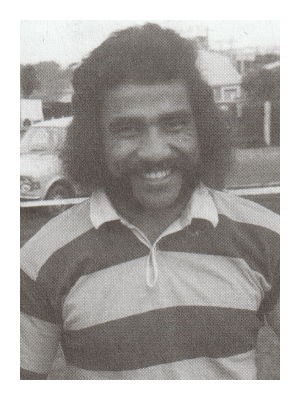
Koko Meilai who was Northcote's answer to Bryan Williams with his daring deeds as a winger in the seventies.
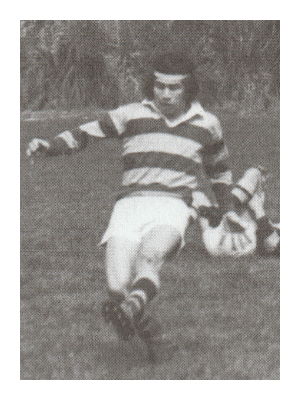
And Eddie Dunn, always with an eye for the gap.
Don Arblaster senior was a policeman. At one time, there seemed to be half the Auckland police force playing for Northcote. Stu Conn, Val Kukutai, Ross Arden, Poppa Nathan, Ross Meurant and Rick Hansen all fell into that category and were all great stalwarts of the club, although Meurant, whose brother Brad coached the seniors to their first championship success in 1989, switched allegiances to Takapuna
The club flourished in 1975, with 10 senior and grade teams taking the field along with 22 junior boys teams, a record at the time. Koko Maki became quite a personality on Eden Park with his strong running and punishing defence. He was Northcote's answer to Bryan Williams. He played three games for Auckland in 1974.
Northcote was awarded the Southland Shield for the first time ever for achieving the highest aggregate championship points across three teams from first to eighth grade. The fourth graders won their championship and with it the Maurice O'Connor Cup while the seniors again claimed the Jordan Rose Bowl.
At the commencement of the 1975 season, the No 1 ground at the new headquarters was sown and earthworks for the No 2 ground commenced. Harvey Wright had organised an in credible amount of 'fill'. He had acquired fill from everywhere, the benefit of always being a down-to-earth ' man's man' with never-ending respect.
The club did not have a license to sell liquor and so alcohol could only be supplied on the production of a meal ticket. Cash purchased only soft drinks, snacks and cigarettes. That would soon change.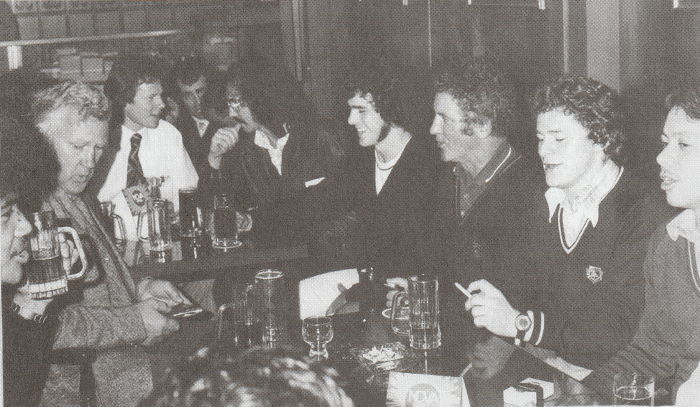
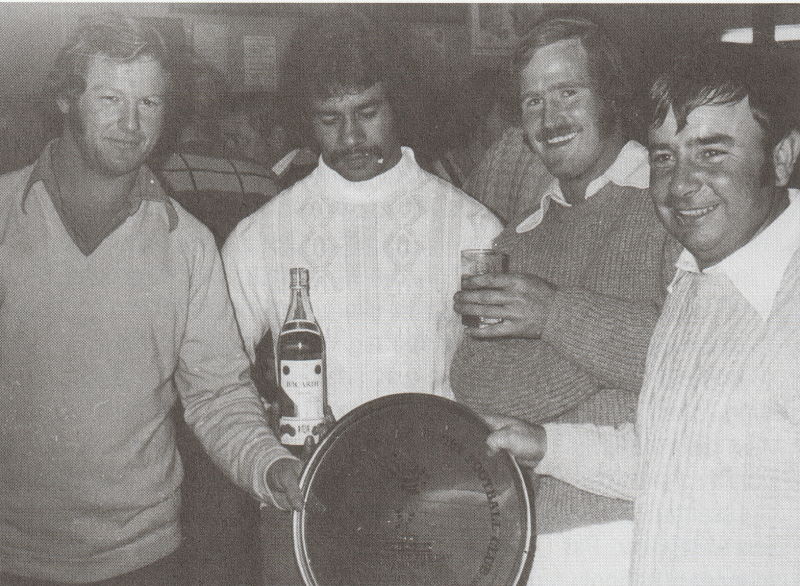
NEWS REPORT 1ZB,
3rd APRIL 1975
Keith Quinn reports that the sponsorship given the Northcote Birkenhead Rugby Club from Gulf Enterprises is a first in New Zealand.
'Northcote's sponsor is Gulf Enterprises,' said Quinn, 'one of the New Zealand franchise holders for Mazda Vehicles. The company has bought the Northcote club all the playing gear for its senior team, spending over $1000.
'Northcote hoped to have the sponsors mentioned on their track suits, but the NZRFU has said that any acknowledgement must be only a simple expression of thanks.
'Another innovation this club is planning is a line-up of 20 baton-twirling cheer leaders. Even the lovely girls have sponsorship, a local fashion shop is supplying their sequined, satin uniforms. How they will go down at Eden Park remains to be seen!'
Again the annual prizegiving took the form of a dinner, this time held at the Peter Pan Cabaret. The guest speaker was Tom Johnson, the youngest NZRFU councilor, who pro posed the toast, 'The Club'.
The 1976 season (the year in which J.J. Stewart's All Blacks toured South Africa) was one in which Northcote received a vast amount of publicity, although not all of it was positive.
The club's promotional efforts were paying off, with a whopping 30 teams fielded, 21 of them by the junior boys committee. The senior team won the Pollard Cup but no championship victories were recorded.
The junior boys sub-committee, under the chairmanship of Harvey Wright, produced its own magazine, providing a brief resume of the performances of each team.
After two years of fundraising and planning, Northcote was off in October on its ambitious 10-match overseas tour, a journey that took the 29 players and seven officials to America, England, Wales, the Netherlands and Hong Kong.
The impressive tour record was:
Beat Hawaii President's XV 19-3, beat California Unicorns 39-0, beat London Wasps 10-9, beat London Metropolitan Police 19-13, lost to Cross Keys 13-16, lost to Ebbw Vale 0-7, beat Stratford-upon-Avon 24-12, beat London New Zealand 21-3, beat Amsterdam Impalas 19-0, beat Hong Kong RFC 19-10.
Tour manager Keith Weber, team manager Bruce Blackett and coach 'Snow' White all agreed that the team played above itself and that the trip was of enormous benefit to the younger players. Many of those who toured have gone on to play a major role in club administration and coaching.
Ralf Harding captained the touring party with Colin Henderson returning as the leading point scorer, topping the half-century. Mark Henderson played in six of the 10 matches and scored all the points in the thrilling 10-9 win over Wasps.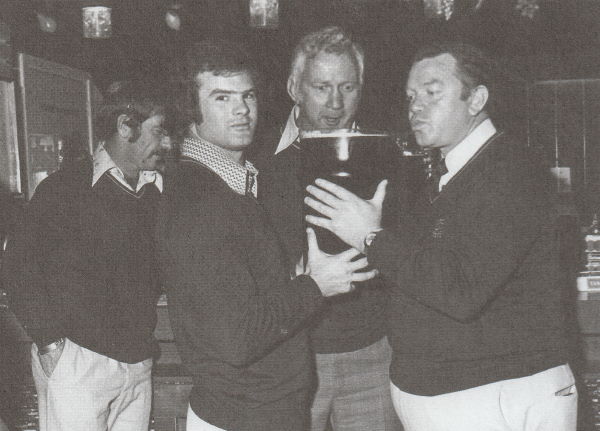
Time out at a Welsh brewery on the 1976 tour for a decent sized beer. It is not recorded which one of Ralf Harding, 'Snow' White or Keith Weber consumed most of it (although we have our suspicions!).
Keith Weber took over as president entering the 1977 sea son when application was made to the Birkenhead City Council for the naming of the grounds at Birkenhead. Harvey Wright Field was the name submitted by the club and this was accepted. The hours of work and planning put in by Harvey made the new headquarters possible and it was entirely appropriate that his name should become permanently associated with the ground.
Opening discussions were held with the Calliope Athletic Club and the Birkenhead Cricket Club to explore possibilities of getting the maximum benefit from the proposed facilities at Birkenhead, both playing and social. The approach was well received but was dashed when the result of the town planning hearing in December was known.
Northcote's Club Spirit magazine won the Air New Zealand prize ($750 worth of sporting equipment) for the best-produced rugby magazine in the top half of the North Island.
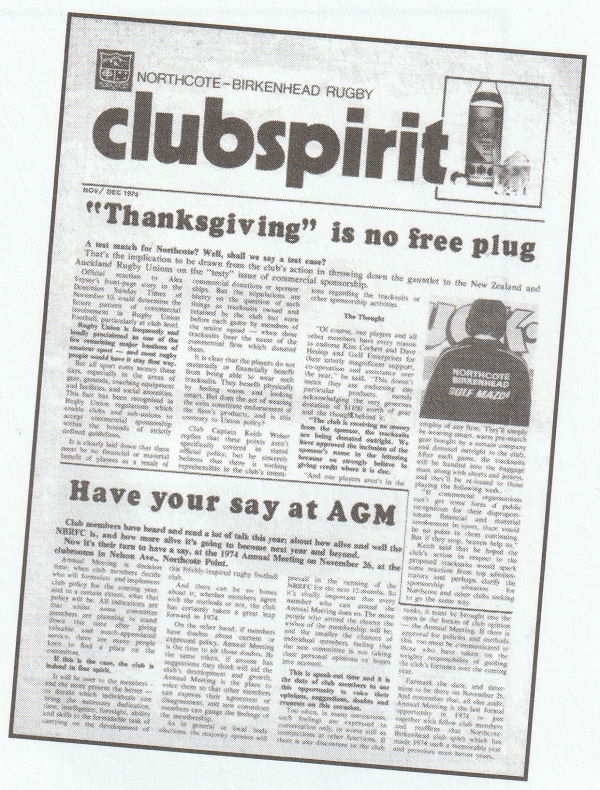
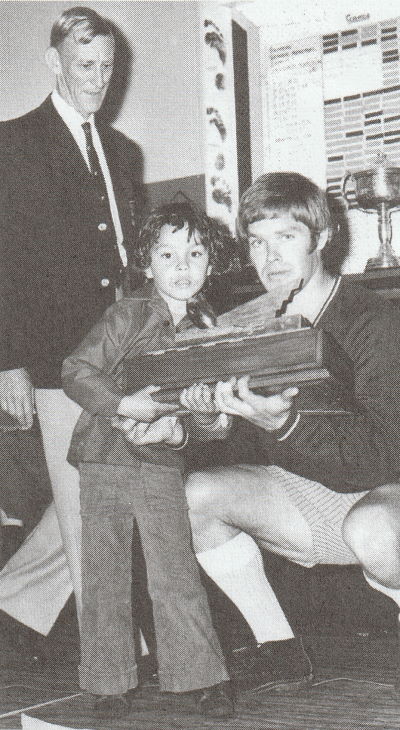
Legislation had been enacted to permit drinking in sports clubs through the issuing of an ancillary licence, granted to clubs that conformed to the requirements laid down.
Concern was expressed throughout New Zealand at some of the conditions and, as it transpired, Northcote's licence was still not issued by 1979, even though its application had gone forward to the Auckland Rugby Union solicitor along with several other clubs' . Because of a pending test case, the ARU withdrew its block application and these were not heard until July 1979.
In the meantime, the club became the subject of what appeared to be another test case that was exploring the powers of the Town and Country Planning Act over the definition of 'use' as applied to the granting of ancillary licences.
Not having a licence didn't affect the club's on field performances and 1977 became a red-letter season for the junior boys teams. Just look at the achievements:
9th grade Maroon: won the Charlie Stone Memorial Cup;
12th grade White: won the ARU Cup;
13th grade Gold: won the 10-a-side tournament;
14th grade White: won the 10-a-side tournament;
15th grade White: won the 10-a-side tournament;
15th grade Gold: won the Bill Elworth Memorial Cup.
Flanker Steve Vaotuua represented Auckland over three seasons, starting in 1977.
The success of the younger teams was particularly gratifying to new president Keith Weber who had for some years been chairman of the junior boys sub-committee.
In addition, the senior A first-five Gary Bancroft took out the George Whyte Kicking Trophy, the first time a Northcote player had claimed this prestigious trophy.
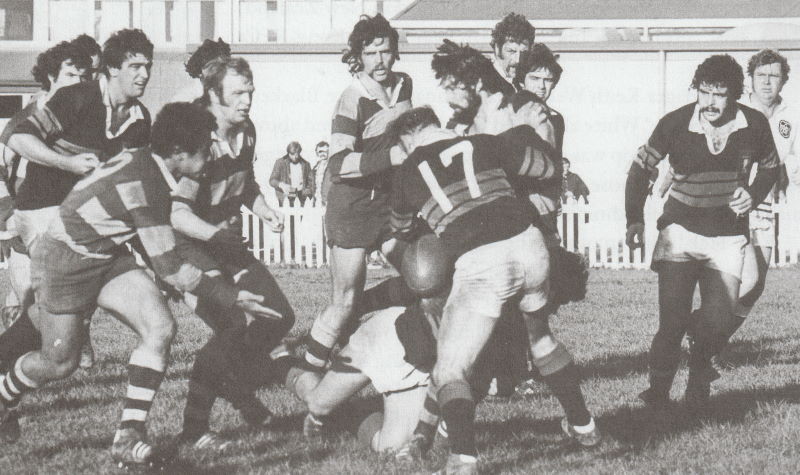
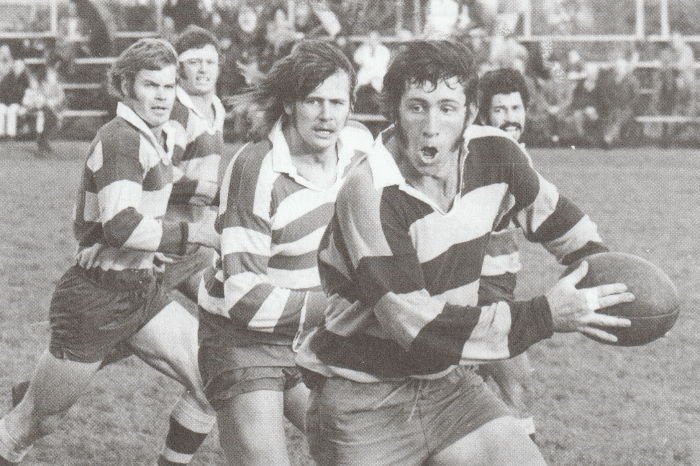
History will tell you that the Puhoi Pub, particularly during the proprietorship of Rod Seymour, was never closed. If you wanted a beer, the pub was always open.
The police always gave him a fair go. On the day Puhoi celebrated its centenary, Northcote was chosen to play the feature match.
It was a Sunday and when the team arrived they noticed the pub was closed. Rod had had a petty argument with the district police sergeant who promptly closed the hotel doors.
Not to be outdone, Rod had crates of beer in a tin shed across the road and traded on. That's just the way it was in those days.
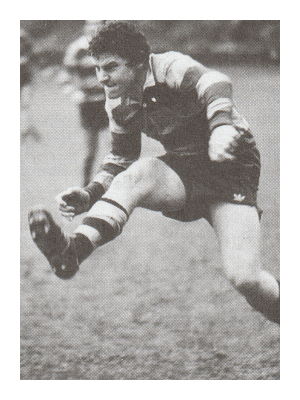
Duncan Taylor's long, distinguished commitment to club and union affairs was recognised at the ARD's annual meeting in March 1978 when he was elected a life member of the union, Northcote having made the nomination.
The club didn't enjoy quite the same success in 1978 as it had in the previous season, although the Northcote White 13th grade team won both the ARD championship and the ARD 10-a-side tournament. The only other notable victory was achieved in 10-a-side competition by the 10th grade combined team.
Gary Bancroft proved himself the most consistent goalkicker in the senior competition by again winning the George Whyte Kicking Trophy.
One individual who made his mark as a third grader around this time was Martin Snedden who won selection for the Auckland under-21 reps. He would achieve greater glory, of course, in cricket, as a New Zealand representative and, in time, as the highly effective chairman of Cricket New Zealand.
Plans for another club tour, in 1980, were approved in principle, with a special general meeting being called at season's finish to ratify a fresh approach to financing tours. The tour sub-committee agreed to take over all fundraising and to pay the club a sum of$20,000 for the franchise for 1979.
Further improvements were made to Harvey Wright Fields with the erection of a $25,000 stand, constructed with assistance from the Birkenhead City Council.
Another application was put before the Town and Country Planning Committee and this resulted in permission being granted for the building of new premises for the RSA, with Northcote rugby taking over the existing RSA clubrooms (subject to the completion of the Reserves Management Plan as required by the 1977 Act). This decision was appealed against by the Birkenhead Residents and Ratepayers association and was upheld by the Planning Tribunal in June 1979.
The legal requirements associated with the transfer to Birkenhead caused a lot of frustration and expense. Through out all these deliberations, 'Snow' White represented the club.
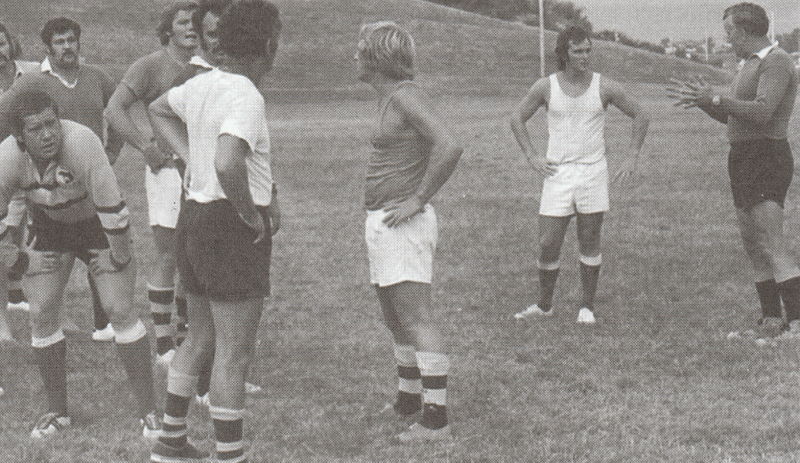
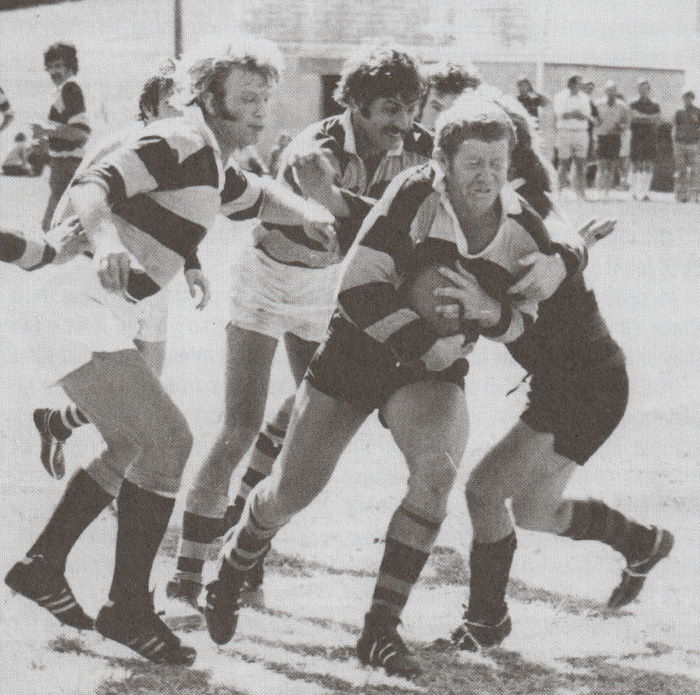
Northcote's last five years under Auckland administration were memorable, starting in 1979 when the first grade team, coached by Bruce Robertson and captained by Brian Munce, and the fourth grade side, coached by Don Clark and captained by Johnny Watson, both won their championships.
The significance of these successes was that they came in the club's 50th jubilee year. Both teams celebrated long and hard, and some say the move to new premises became necessary after that!
The senior team positioned itself to win the Jubilee Trophy but was thwarted by Eden in the final game. However, the premiers did win promotion to senior A for 1980.
Keith Weber resigned as president during the year, being replaced by Bruce Blackett who occupied the office through to the next annual meeting.
Subscriptions in 1979 were $25 for senior and grade players (reduced to $20 for students) with players required to buy their jerseys, $7 for junior boys with all gear supplied. A fam ily subscription cost $15.
The balance sheet as at 30 September recorded accumulated funds at $151,318. Fixed assets were $91,461, the major portion of that being funds in the bank worth $51,129.
